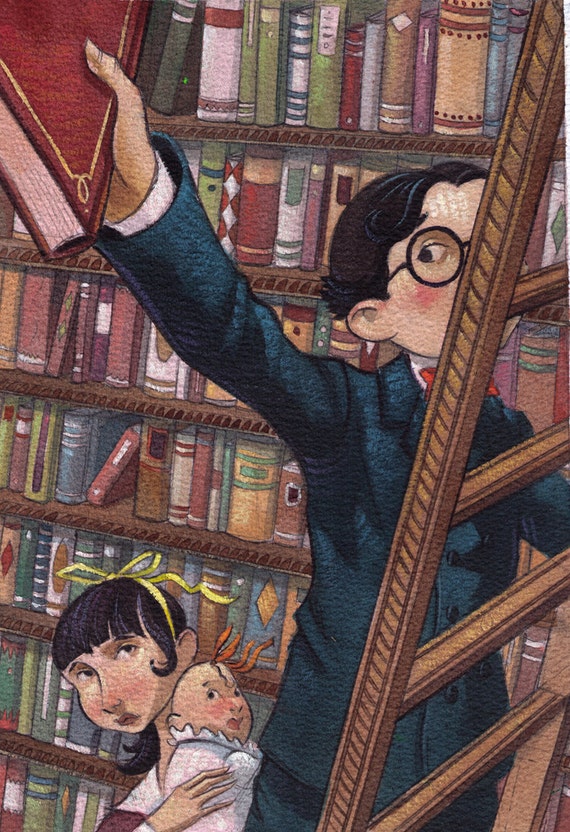Reading is One Form of Escape. Running for Your Life is Another.
Illustration by Brett Helquist
"All of the secrets of the world are contained in books. Read at your own risk."
- Lemony Snicket
A Series of Unfortunate Events consists of 13 novels written by Daniel Handler under the pseudonym Lemony Snicket. It follows the lives of three children, Violet, Klaus and Sunny Baudelaire, after the mysterious death of their parents. After being placed into and then escaping the custody of their villainous relative Count Olaf, they are pursued throughout all 13 books by Olaf and his henchmen, who wish to steal the children's vast fortune. As the series progresses it is revealed that everything is not as it seems, as they are faced with a variety of strange obstacles, people and places and begin to uncover more and more about a secret organisation only known as VFD. They discover and unravel several mysteries, but in the end not everything can be explained.
The story is narrated by Lemony Snicket, who works tirelessly to uncover the truth about what happened to the Baudelaires, though he finds the tale almost to sad and unfortunate for anyone to bear. With a cynical, yet humorous tone, he often urges the reader to put the book down and pursue more enjoyable and pleasant hobbies but his clever and unique way of writing keeps you drawn to the children's tale of woe.
"Grief, a type of sadness that most often occurs when you have lost someone you love, is a sneaky thing, because it can disappear for a long time, and then pop back up when you least expect it."
- The Carnivorous Carnival
“Fate is like a strange, unpopular restaurant filled with odd little waiters who bring you things you never asked for and don't always like.”
- The Slippery Slope
"People aren't either wicked or noble. They're like chef's salads, with good things and bad things chopped and mixed together in a vinaigrette of confusion and conflict."
- The Grim Grotto
The mysterious organisation VFD is a main feature in the books. Exactly what VFD does is unclear, as its members go to great lengths to conceal all traces of their activities. However, it is strongly suggested that the main purpose of the organisation is firefighting, amongst many other humanitarian acts. There's also a great respect held for literature, and it is believed that people who read cannot be evil. In Daniel Handler on Childhood Handler mentioned that the question he is most often asked about the series is "Is [VFD] real? Is there really a secret society of literature?" to which he replies,"Yes, and you're in it."
VFD stands for humanitarianism and the importance of being well-read, and we're all members. However, it also stands as an acknowledgment that there are as many good people as bad people in the world. Though there are many observations of the distinction between good and evil, and how right will always come out on top ("Right, good temporarily defeated, is stronger than evil triumphant.” - The Reptile Room) as the series progresses it begins to display strong themes of moral relativism, as the Baudelaires become more confused during the course of the series about the difference between right and wrong, feeling they have done wicked things themselves and struggling with the question of whether the end justifies the means. Evil characters are shown to have sympathetic characteristics and often have led difficult lives. Similarly, good characters' flaws become major problems. Almost every major character in the books has lived a life as difficult as that of the Baudelaires, especially the villains. In The End Count Olaf, a past member of VFD, observes that he's "no worse than anyone else", and it is an unsettling moral lesson to think that, in some ways, he may be right.
These complex moral views along with a myriad of other themes drives ASOEU and has resulted in it being an exceptional piece of literature that has a lesson for all readers. It's a reminder of some of the realities of life, tied up in a bizarre tale about three orphans who've done nothing to deserve their fate but keep their chins up regardless.
For those who read last weeks entry, the answer is of course D. Life is a nightmare, so why not have one?








0 comments: